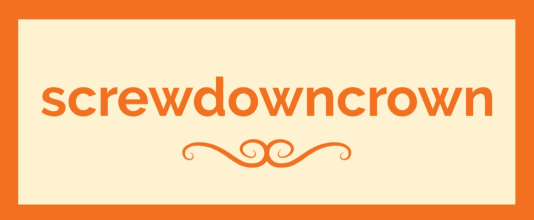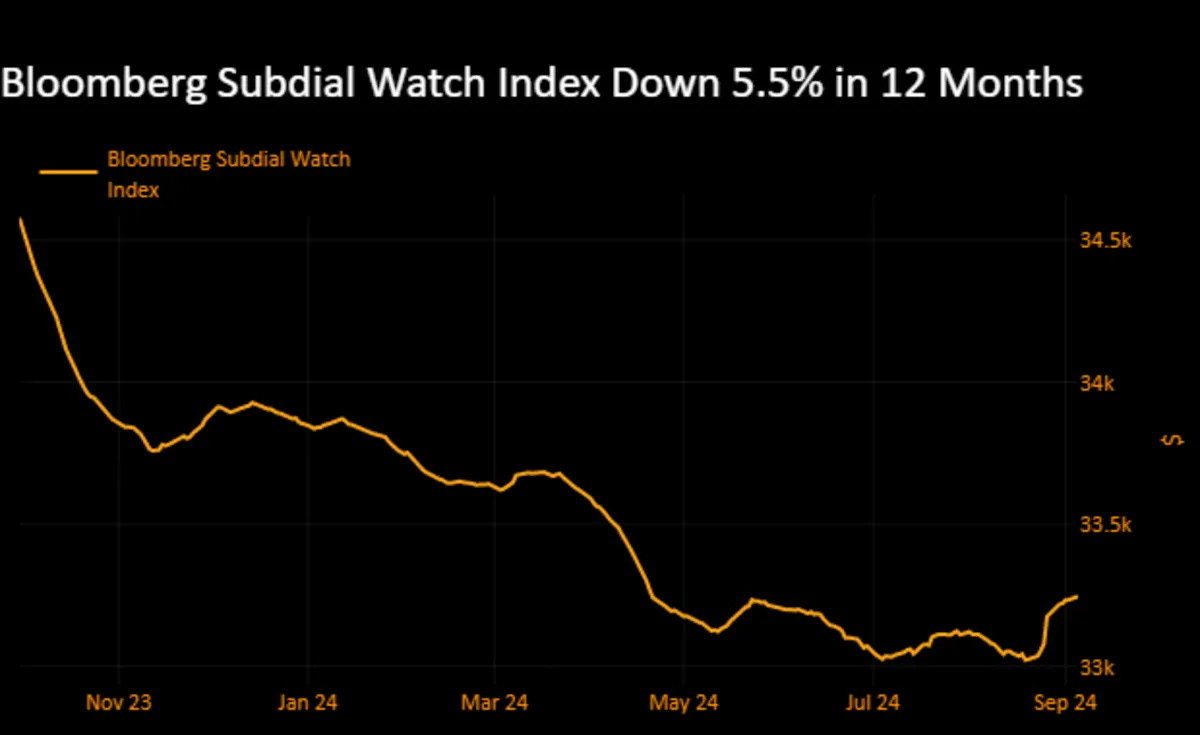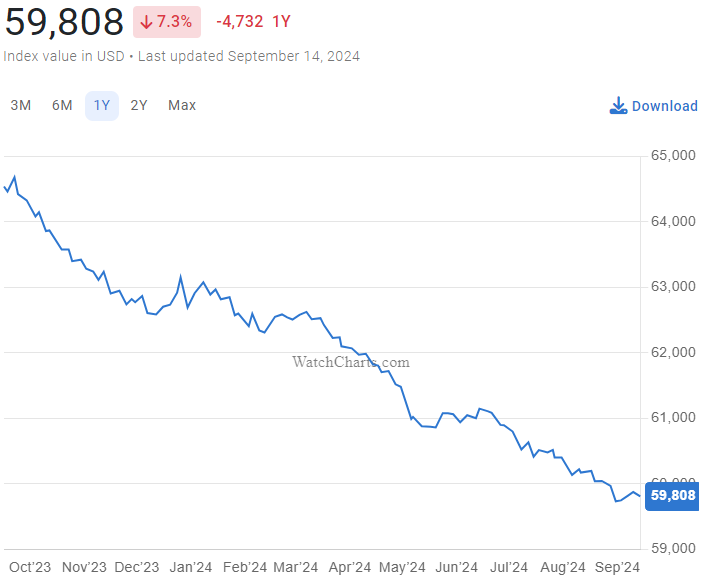SDC Weekly 66; Richemont Update; The Cost of Cynicism; Correlation vs Causation
Patek Patents and the New Release; LVMH, Rolex & F1; Olympics and Omega; State of the Industry; Studio Underd0g Shenanigans, Watch Collector Traits and more...
🚨 Welcome to another edition of SDC Weekly. Estimated reading time: ~35 mins
This week, we explore watch sponsorships, examine Richemont’s latest moves, ponder the cost of cynicism in collecting, and unravel the complexities of correlation vs causation in the watch market. We’ll also touch on Patek Philippe’s new patents, Studio Underd0g’s pricing strategy, and LVMH’s alleged involvement in Italian sweatshops.
If you’re new here, welcome! You’ll find previous editions of SDC Weekly here.
🎈 Small stuff
Major Sponsorship and Brand Marketing Thoughts
A recent Bloomberg article highlighted the unexpected decline in Omega watch prices, despite their high-profile role in the 2024 Paris Olympics. According to the Bloomberg Subdial Watch Index, prices for pre-owned Omega watches experienced a ~1% decline over the past 30 days. This comes as a surprise to many, given Omega’s recent prominence as the official timekeeper of the Paris Olympics.
This divergence obviously raises questions about the efficacy of high-profile-sponsorship and the factors driving consumer preferences in the luxury watch segment. These events undoubtedly boost brand awareness, but their impact on market prices appears to be limited, at least in the short term.
The WatchCharts Overall Market Index, which tracks a broader range of luxury watches, shows a 7.3% decline over the past year, and 0.7% drop in the last 30 days. This suggests that while the market may be stabilising, it’s still recovering from a significant downturn.
—
Quick tangent: I just found this article by Christy Davis (Co-founder of Subdial) where he discusses how and why the Bloomberg Subdial Watch Index and Watchcharts have reported conflicting trends for Rolex prices in August, with one showing a slight increase and the other a decrease. Essentially, the factors that can lead to differences between indexes include: the selection of models in the index basket, exclusion of anomalies and data verification methods, accounting for discounting practices in the pre-owned watch market, averaging and smoothing of data over time, and currency differences. He seems to suggest both approaches can be valid, but differences in methodology will lead to different outputs. No sh*t, I suppose. Garbage in, garbage out. I’d expect Hamza Masood (WatchCharts) ought to publish his own rebuttal, explaining why WatchCharts has a reliable approach - but this is beside the point in this section.
—
As we move forward, I think it will be increasingly crucial for brands to engage with consumers in meaningful ways that go beyond traditional marketing. I mean, Omega probably spent a fortune on these Olympic games, and they seem to have nothing to show for it?! What else could they have done? Here’s a few thoughts:
Interactive Digital Experiences: Create virtual reality or augmented reality experiences which allow clients (who aren’t even at the Olympics) to “participate” in their events. For example, an Omega VR experience could let users feel like they’re timing Olympic events or exploring the moon with an Omega Speedmaster. What’s the point of allowing journalists to get free trips and post a couple of stories? Nobody trusts them anyway.
They could even develop mobile apps which gamify the sponsored event experience, thus encouraging users to engage with the brand daily. I am surprised this hasn’t already happened.
Limited Edition Co-creations: Why don’t they involve consumers in the design process for limited edition watches tied to sponsored events. This could be through voting on design elements or even allowing top fans to collaborate directly with designers. It’s tiring to see the bullsh*t created by the designers resulting in a random ‘unveiling’ but imagine if this was a public vote of design options, including a competition and maybe some random members of the public winning trips to the Olympics (instead of wasting that money on journalists) - which option do you think would resonate with customers more? They could also create “insider” editions only available to those who engage deeply with the brand during sponsored events - another angle to the gamification.
Experiential Marketing: They could offer exclusive, hands-on experiences related to the sponsorship event. For instance, Omega could provide enthusiasts with the opportunity to learn about and use official Olympic timekeeping equipment. We saw a little bit of this through the journalists on site, but why not open this up to the public? They have done this to a degree, but they should also host more pop-up events in major cities prior to the sponsored events - this allows people to interact with the brand in immersive, themed environments, which they can actually relate to when the event starts.
Educational Content: This seems like an easy one, but they could produce high-quality, in-depth content that goes beyond just superficial nonsense we see today. This could include documentaries about the technical challenges of timekeeping in various Olympic sports or the history of timekeeping in space exploration. They could even offer masterclasses or webinars featuring brand ambassadors, watchmakers, and other experts, providing proper value to enthusiasts. This could be linked to the CRM and gamification mentioned above, where true enthusiasts of the brand could be identified and appropriately rewarded.
Community Building: You know, this baffles me constantly. Why do brands not take advantage of existing communities or forums with specific brand enthusiasts? Why is there no behind-the-scenes content, early access to new releases, and direct interaction with brand representatives, set aside for anyone but the most wealthy buyers of the brand? I get that it is costly, and they are targeting the ‘big spenders’ to keep them spending - but here, we’re talking about marketing. You think the big spenders give a damn who is being sponsored? For real marketing value, they need to tap into these communities and make people excited to be a part of the community. This can’t be allowed to remain passive. Why do brands leave it to RedBar and other clubs to organise local meetups or events for watch enthusiasts? They should do it themselves, too!
Collaborative Storytelling: Brands need to up their game in this regard. Adidas and Nike seem to do well at this, but the idea that brands should encourage users to share their own stories and experiences related to the brand and its sponsored events, will create a rich set of organic user-generated content. Brands can then feature these stories prominently in marketing materials and at events, making consumers feel like a genuine part of the brand narrative. Imagine a daily competition of a user posting on social media with a hashtag #MyOmegaOlympics or something - the team picks a winner every day and they get a free MoonSwatch or whatever - how much buzz would that create? For the price of a MoonSwatch. Too easy, honestly.
Post-Event Engagement: I have seen none! Why don’t they develop strategies to maintain engagement after the sponsored event is over? This could include yearlong challenges, content series, or community activities that keep the excitement alive.
I could go on, and while this was about Omega, it easily applies to other brands. By implementing these types of strategies, brands can create deeper, more meaningful connections with consumers. This sort of stuff would help ensure high-profile sponsorship actually translates into genuine engagement and brand loyalty - and they could avoid situations like the one Omega finds themselves in, where market performance doesn’t reflect the visibility gained from a huge sponsorship.
The key to all this, is to move beyond passive viewership and create active participation. This fosters a sense of community and shared experience around the brand (and its sponsored events), and that sort of deeper engagement likely to influence consumer behaviour and perceptions in the long term - as opposed to flying Wei Koh and his mates over to film content and have a fun time. 😂





